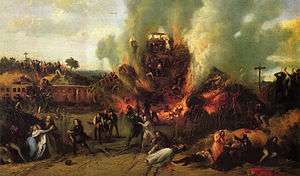Train wreck


A train wreck or train crash is a type of disaster involving one or more trains. Train wrecks often occur as a result of miscommunication, as when a moving train meets another train on the same track; or an accident, such as when a train wheel jumps off a track in a derailment; or when a boiler explosion occurs. Train wrecks have often been widely covered in popular media and in folklore.
A head-on collision between two trains is colloquially called a "cornfield meet" in the US.[1]
Legal consequences
Because train wrecks usually cause widespread property damage as well as injury or death, the intentional wrecking of a train in regular service is often treated as an extremely serious crime.
For example, in the U.S. state of California, the penalty for intentionally causing a non-fatal train wreck is life imprisonment with the possibility of parole.[2] For a fatal train wreck, the possible legal consequences are either life imprisonment without the possibility of parole, or even the death penalty. The willful wrecking of a train is punishable by death or life imprisonment without parole by the United States federal government.[3]
The unusual harshness of California's train wrecking statute has been expressly recognized by its appellate courts. The Supreme Court of California explained in 1972 that train wrecking is one of only eight crimes in the California Codes for which a capital sentence is authorized.[4] The California Court of Appeal pointed out the next year that (at that time) train wrecking was the only other crime besides aggravated kidnapping in the Penal Code for which the Legislature had expressly established the punishment of life imprisonment without the possibility of parole.[5]
See also
- The crash at Crush, Texas, an intentional train wreck conducted as a publicity stunt
- Emergency management
- Head-on collision
- Railway accident deaths
References
- ↑ Glossary of rail transport terms
- ↑ "Section 219". California Penal Code. Retrieved 2011-03-30.
- ↑ 18 U.S.C. § 1992.
- ↑ People v. Anderson, 6 Cal. 3d 628, 652 (1972).
- ↑ In re Maston, 33 Cal. App. 3d 559, 564 (1973).
Further reading
- Aldrich, Mark. Death Rode the Rails: American Railroad Accidents and Safety, 1828-1965 (2006) excerpt
External links
| Wikimedia Commons has media related to Train wrecks. |
- BBC News: World's worst rail disasters
- A signalman (1874). A voice from the signal-box: or, railway accidents and their causes. London: Longmans, Green, & Co.
